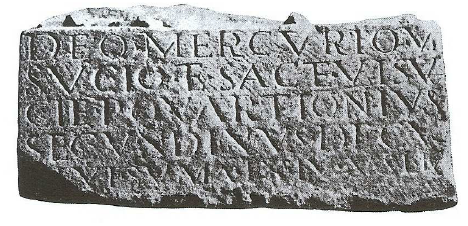c) Mercurius Visucius and Visucia
It is significant that Mercurius is given a Celtic divine epithet Visucius and partnered with a goddess Visucia in an inscription found in 1832 in Köngen, situated to the east of Stuttgart (Germania Superior): Deo Mercurio Visucio et sa(n)ct(a)e Visuci(a)e P(ublius) Quartionius Secundinus decu(rio) c[ivi(tatis)] Suma(locennensis) ex iu(ssu) v.s.l.m, ‘To the god Mercurius Visucius and to the sacred Visucia Publius Quartionius Secundinus decurio civitatis of Sumalocennensis according to an order paid his vow willingly and deservedly’.’ 916 This inscription is engraved on a socle of a statue, but only the feet of the two deities remain (fig. 32). The dedicator bears the tria nomina of the Roman citizen and is part of the political class, for he is a decuriocivitatis*, i.e. the person in charge of public contracts, religious rituals, order, local tax collection, etc.
Visucia undeniably is the female doublet of the god Visucius. She is generally held to be mentioned in another inscription discovered in Trier, but the stone is very damaged and the reading is thus very uncertain: DAE V[…] IÉ CI CVI. 917 In this inscription, she is given the title of sancta, ‘venerable’ or ‘sacred’, which is sometimes given to goddesses in the dedications from the two Germanies. This formula was in use from the middle of the 2nd c. AD to the end of the 3rd c. AD.918 As for Visucius, he is honoured alone in three inscriptions from Heidelberg, Pfalsbourg and Herapel (Germany),919 and associated with Apollo in an inscription from Saverne (Germany)920 and with Mercurius in six dedications from Bordeaux (Gironde), Agoncillo (Spain), Esthal, Hockenheim, Trier and Varuswald (Germany).921
The meaning of their names remains obscure and is still much debated. Delamarre suggests that Visucius might mean ‘crow’, visuco- being possibly cognate with Old Irish fiach, derived from *uisuco- or *uesākos, ‘voracious’ - from an IE root *ues-, ‘to eat one’s fill’.922 As far as Olmsted is concerned, he glosses Visucius and Visucia as ‘the Worthy’ from an IE root *vēsu, ‘good’ or ‘worthy’.923 Visucius and Visucia might also be derived from the root *visu (<IE weid, ‘to know’) meaning ‘who knows’, ‘who foretells’, ‘who sees’, also found in the goddess name Visuna, mentioned in an inscription from Baden-Baden (Germany).924
